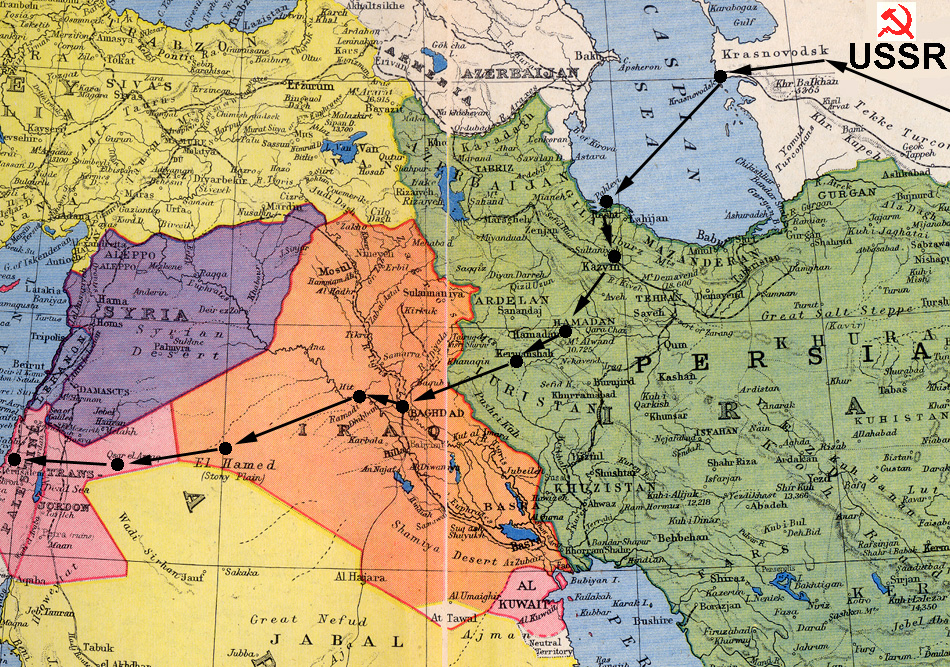The 1st Independent Polish Parachute Brigade
(1 Samodzielna Brygada Spadochronowa)
The Middle East
My evacuation route from the USSR across the Caspian Sea, through Pahlevi (Iran) and into the Middle East (Yibna).

I was not in Pahlevi very long, my memory fails me as to exactly how long but as was customary we were quickly moved on to more permanent camps in the Middle East. Some stayed in Pahlevi for days, others for weeks even months.
as I cannot recall my journey form Pahlevi To Yibna I must rely on other accounts that tell us that Irania drivers took us along dusty, windy and dangerous mountain routes. Typically this would invovle a drive from Pahlevi to the Persian-Iraqi border.
Then we would drive to Baghdad in Iraq, resting in Habbaniya near a lake. The journey would then continue through Ramadi, Rutba and the transjordanian desert to Palestine. At Palestine we would make for Yibna.
The roads from Pahlevi to these areas were very windy (particularly from the Caspian to Quazvin), mountainous and treacherous and often involved overnight stays in schools on the way sleeping on the floors before commencing the journey the next day.
The more permanent camps were in Tehran, Mashhad, and Ahvaz. Tehran possessed the greatest number of camps. I saw a constant stream of trucks, lorries and buses transporting the exiles by way of awkward twisted roads from the Caspian to Quazvin, where I hear they were put up for the night on school floors, before continuing their journey next morning to the capital.
I later heard from various others who had undertaken this journey that the government of Persia had made swimming baths available exclusively for the Poles along the way to wash in. Other buildings were provided for rest on the way too. I could not believe what was happening compared to my time in Siberia!
(Story piece added by author, factually correct but not proven to be part of Wladyslaws): On the way to my camp we passed through Tehran where there were 5 transit camps. One of them was an army camp, the other 4 were civilian. Camp No2, the largest, was simply a collection of tents on the outskirts of the city. Camp No 4 was in a munitions factory that was deserted. What I found most surprising was that camp No 3 was in the Shahs own garden with flowing water and beautiful trees , what a kind man!
I was also heartened to see that most of the able-bodied men and women, evacuated as civilians from the Soviet Union enlisted into the army. Poland would rise again and the fighting spirit I saw in my fellowman was encouraging.
Eventually we arrived at my transit camp, a basic affair. We stayed there for a while, training and getting our health back.
Very quickly it was decided to evacuate the entire Polish army to Lebanon and leave behind those over military age and children. These I would later find out, remained there for up to 3 years before finally moving on.
Whilst in the Middle East we quickly required more than food, drink and shelter. Something more was needed and so art, culture, music and dramas became the norm. Our mental health improved massively with this and we felt less despondent and more hopeful about our future.
I particularly loved listening to the Polish radio stations that sprung up as well as reading Polish newspapers that my fellow poles produced.
The spirit of culture that existed between us poles and the locals was amazing, why on an average day you could walk down the high street in some Middle East town and see Polish flags above restaurants.
A Change Of Unit
Although I had originally fought in the 42 Infantry Regiment (AKA 42 Pulk Piechoty) against the Germans and Russians, that unit being liquidated resulted in me joining 28th Infantry Regiment (28 Pulk Piechoty) in the Soviet Union under General Anders.
Now, in the Middle East, I was yet to go through another similar change.
On 5th May 1942 the following sections of the Polish Army (1 Corps) were liquidated:
- The 10th division (this included the 28th Infantry Regiment)
- Polish Independent Carpathian Rifle Brigade
- 8th Infantry Division
- 9th Infantry Division
All the above units were combined in Palestine on 5th May 1942 and then split into the 3rd Carpathian Rifle Division and 4th Carpathian Rifle Division.
As a direct result of this I ended up being temporarily assigned to another unit whist in the Middle East (Yibna).
Yibna - May 1942
In May 1942 I was located in Yibna with infantry. My younger brother, Aleksander, was also in Yibna with me at this time. It was good to have his company, we stuck together and looked out for each other.
It was whilst I was in Yibna that I became aware that General Sosabowski (who was at Largo House in Upper Largo, Fife, Scotland) was looking for volunteers to form a Polish Parachute Brigade in Scotland. There was extra money too and so I was assigned to Obóz Rozdzielczy (Which is Auctertool Distribution Camp) in Scotland. A new life and new challenges awaited me.
There was a plan to strike back at Hitler and win Poland back. Exciting! I wanted to be part of this.
I cannot even begin to tell you what pain, determination, life experiences, starvation and more that those miles had put me through! But I was strong! I was Wladyslaw Hoscik!
Calling All Parachutist Recruits - 6 May 1942
The idea was that we polish soldiers could be dropped by parachute into Poland to fight back at the Germans and gain freedom for our country again.
I had never heard of this "1st Independent Polish Parachute Brigade" but it sounded like a good challenge and the pay they were offering (2 shillings per week) was a lot more than I was currently being paid.
I was passionate about my country and the pay for a parachutist was substantially more. I thought about it long and hard and thought, "why not?" and promptly signed up.
So on 6th May 1942 I enlisted for this new role and thus began my journey out of the Middle East.
Further Reading
- Account of Franek Rymaszewski (Via Google Wayback): http://homepages.ihug.com.au/~frym/15emails.html
- According to Appendix D of the "Ross report", it was mainly civilians that went to Teheran, troops went to Hamadan. At Hamadan there was "onward clearance" to another site.
Please Donate!

Uncover The Past - Support The Future
Please don't "grab & go"! Each year, 12,000 people visit this website to trace their Polish ancestry, uncover family stories, and connect with their roots. I believe that history should be accessible to all - but keeping this website alive since 2017 comes at a personal cost to me, 8 years @ £1000 per year (website mgt fees) has left an £8000 dent...with only £502 in total donated up to 31/01/26 😱😱😱.
Every detail you uncover and every story you piece together helps you piece family history together. Please donate if you found the existing information on this site useful, help me keep the site alive! Thanks! Jason Nellyer (Researcher & Site Owner)
PS - You'll even get a personal thank you for me for any donations. Truly valued!